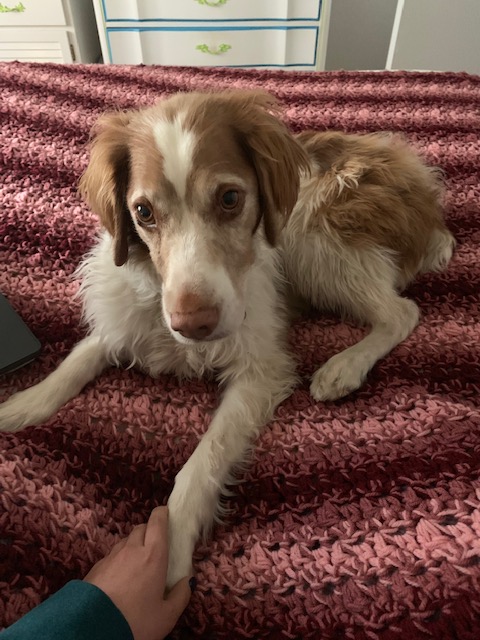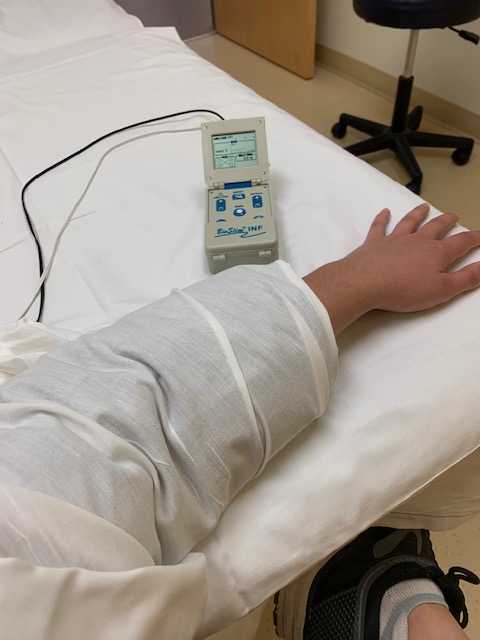
Graduate Injuries
Reposted with permission from Mary Madera. This was originally posted to the Plantae Student Space Network for the Graduate Perspectives Collection. See original post here.
As I sat in my parent’s recliner, my left leg and arm propped carefully on about 6 pillows, both swathed in ice packs, with this pup by my side, dictating emails into my phone, I knew exactly how the next month of recovery would pan out for me as a first year graduate student. Certain things would be difficult or annoying, but I knew people would be understanding and by the end of it, very little would actually be affected. And then I thought through a different scenario: would that plan and reassurance be different if my ailment was invisible, like struggling through a mental illness or a tough autoimmune disease diagnosis? Yes. It would absolutely be different.

Between classes, meetings, papers, and experiments, the last thing any graduate student wants to deal with is an injury or illness. But, life happens and healing takes time even for small ailments. On my way to class the morning of May 8th, the day after a grueling 12 hour work day of 7am strawberry harvests, hours on my feet processing samples, and several lengthy meetings, I crashed my bike. As my head smacked into the pavement, my stress and overwhelmed feelings of how large my to-do list of research and homework was were replaced with equally overwhelming gratitude that I was wearing a helmet. Funny how quickly priorities can change.
As the shock-driven hysteria and pain continued to build while I awaited the arrival of my absolutely gracious and wonderful housemate (who also missed class that day to drive me to and from the campus hospital), I began to plan. I planned who to contact first - parents, then, classmates to report our absence, then PIs (I am co-mentored), then lab managers, and finally, professors. I planned how I’d adapt my research plans which demanded physical labor and how I’d get around the large Davis campus. I alerted folks that I’d be forced to work from home for the next few weeks and how best to contact me. I planned how I’d cook, get dressed, and what I’d give up over the next 4-6 weeks (I’ve broken enough bones as a kid to know what a broken arm felt like and how long they took to heal). In hindsight, this was perhaps misguided as I was still convinced I had a concussion, but in the moment it just felt pragmatic and responsible.
Thankfully, my injuries were minor, but definitely inconvenient. No concussion (all hail helmets), a massive hematoma in my left knee, and broken arm near the elbow joint that needed to start painful physical therapy as soon as possible. I couldn’t use my left arm or leg for anything; I couldn’t type, get up stairs to my bedroom, or even get from one room to the next without screaming pain in my knee. I was lucky enough to have the ability to spend the week with my parents and our dog (nothing beats pet therapy), just dealing with the pain and a couple emails here and there. I did a little work from home, but most of it had to be pushed back to the next 2 to 3 weeks. I knew this would have little to no effect on my grades and research, which was comforting. Technology would help me type, and making up a couple weeks worth of work was absolutely manageable, just far less than ideal.
When I returned to campus the next week I was consumed with thoughts about how fortunate I was that I had a visible injury. I’m very lucky that I have supportive and understanding parents nearby, classmates willing to take notes, and bosses that understand health has to come first. I had no hesitation whatsoever contacting people and reporting my broken bone, bum leg, and bike crash; they are injuries that are hard to argue with, the subsequent, but temporary, limitations are easy to understand, and they are very visible. Wearing a sling and limping around with a visibly swollen leg is obvious and comfortable enough for people, professors, classmates, and strangers to ask what happened and be a little more careful around you.
But, how would this scenario have played out if instead of a bike crash and broken bones, I was overcome by something invisible: depression, anxiety, autoimmune disorder, a brain injury (again, all hail helmets)? How easy and acceptable would it have been for me to skip classes, research, and submit classwork from home? What would I have done if the recovery time was much longer, or not a recovery at all, but a total life readjustment? On a similar note, how are graduate students with existing disabilities, visible or invisible, temporary or permanent, treated and accommodated?

I certainly don’t have solutions or answers to these questions. Of course, each person, injury or health concern, both mental and physical, are unique. Each person with a disability, long-term illness, or personal struggle wants to and chooses to handle it in their own way and that should ALWAYS be respected. As professors, peers, and classmates, this can be difficult to navigate, but I do know that being kind and patient certainly never hurt anybody.
My story is short and simple. It sucked adding hassle onto the stress of being a first year grad student at the very beginning of my project’s development. I had to be okay asking for certain forms of help from various people, and if I wasn’t okay with that, I had to get resourceful. I had to accept that for a little while I had limitations my classmates didn’t, like the inability to type, and I had to totally restructure my harvesting plan and ask my labmates to harvest all of my material for me. Yet, at the end of the day, I knew there’d be no lasting issues regarding my health, my professional relationships, my schoolwork, and my research. I was extremely aware that this is not always the case, and I felt very grateful. I will certainly not hesitate to go the extra mile when one of my peers or labmates needs a little extra help.
If you are a graduate student or postdoc with your own story of injury, illness, or major life adaptation that you’d like to share, please do! School and research seem to dictate our lives, until life events demand otherwise, and then it can be difficult to juggle the two. Anonymous responses are welcome. Share your tricks, your struggles, your life lessons, your research hacks, your advice, anything you feel will help you or another struggling grad student get through some of life’s unexpected turns. And as always, I hope everyone will be patient and respectful to those around them and those who wish to post here, for many ailments are invisible and many people will choose to deal with them in a way that you would not. Email articles/pictures to gradstudentperspectives@gmail.com
Mary Madera is a graduate student in the Plant Biology Graduate Group at University of California, Davis. For more content from the UC Davis science communication group "Science Says", follow us on Twitter @SciSays.

Comments